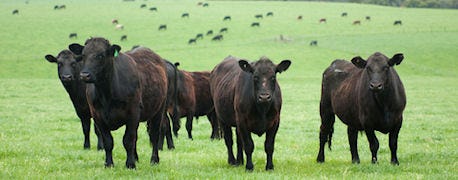October 9, 2013

Animal health officials are urging cattle farmers to take preventive measures against Epizootic Hemorrhagic Disease in cattle in light of two recent confirmed illnesses. The Wisconsin State Veterinarian encourages the use of insect control to eliminate biting midges and black flies, which are common carriers of the disease that primarily affects deer, but can also infect cattle and other ruminants.
"We already have reports of EHD in Wisconsin cattle, and until we have a hard freeze to kill the midges and flies, the virus will continue to be a threat to our cattle population," said Dr. Paul McGraw, State Veterinarian.

Epzootic Hemorrhagic Disease Confirmed In Wisconsin Cattle
EHD in cattle is rare, but can happen when environmental conditions support insect growth. Signs include fever, ulcers in the mouth and gums, swollen tongue, excessive salivation, and lameness or stiffness when walking. Death loss is uncommon in cattle. There is no evidence that the EHD virus can infect humans or that it is transmitted between animals.
"The symptoms of EHD are similar to those of Foot and Mouth Disease. So, farmers who notice signs of illness in cattle are encouraged to immediately contact their veterinarian to rule out a possible foreign animal disease," McGraw said.
EHD is more common in the southern United States and among the white-tailed deer population. This is the first year that cases of EHD in cattle have been reported in Wisconsin. A private practitioner first reported the cases to the department, samples were sent to the Wisconsin Veterinary Diagnostic Lab to assure rapid results while confirmatory testing was being done at the Federal laboratory.
Source: Wisconsin DATCP
You May Also Like




